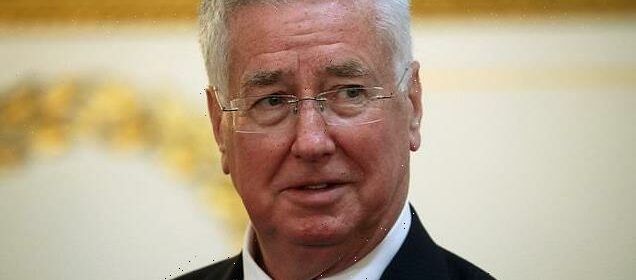Ex-defence secretaries urge Government to hike military spending

Trio of Tory ex-defence secretaries urge the Government to hike military spending in next month’s budget amid fears Britain could fail to meet its NATO obligations
Three former defence secretaries today urge the Government to increase military spending in next month’s Budget.
The Tory trio – Sir Michael Fallon, Sir Malcolm Rifkind and Michael Portillo – warn the threats facing Britain today are ‘even hotter’ than during the Cold War.
But they point out that Britain is spending less than half of what it did on defence then in terms of the percentage of GDP. They also say the UK risks failing to meet its Nato obligations.
The interventions, in interviews with the Daily Mail, will pile more pressure on Prime Minister Rishi Sunak and Chancellor Jeremy Hunt to find more cash for defence amid warnings that Britain risks falling behind France as Nato’s foremost military power in Europe.
Defence Secretary Ben Wallace is asking the Treasury for between £8billion and £11billion more in defence spending. But he admitted this week that he faces an ‘uphill battle’ with Treasury officials, who have concerns about whether the money will be well spent.
Sir Michael Fallon said: ‘We were spending twice as much during the Cold War and we’re now facing even hotter threats’
Sir Michael, who was defence secretary under David Cameron and Theresa May from 2014-17, said: ‘We were spending twice as much during the Cold War and we’re now facing even hotter threats, including from new weapons and new technologies of all kinds.’
At the peak of the Cold War in 1984, Britain spent 5.5 per cent of GDP on the military – £57billion on a GDP of £1.037trillion.
It fell to 2.7 per cent in 1997 and, by 2004, the figures plunged to 2.2 per cent on £1.8trillion GDP – meaning the armed forces got just under £39.5billion.
It twice hit 2.1 per cent under the Conservative and Lib Dem coalition between 2010 and 2015 – narrowly achieving the Nato benchmark of 2 per cent and it has not risen above 2.5 per cent since 2010.
Sir Malcolm, who served as John Major’s defence secretary between 1992 and 1995, said: ‘There are particular gaps that do need to be filled and they’re not necessarily all that expensive. It’s the Army I’m thinking of particularly. The Army is roughly about 70,000 manpower. I think that is too small for the obligations we have or are likely to have and I think it should be increased to 100,000, back to where it was not that long ago.
‘That is a manpower cost, it’s not investing in hugely expensive ships or aircraft or whatever.’ Britain spent £58billion on defence last year – about £13billion more than France – but has 150,350 personnel across its navy, air force and army, compared with France’s 203,250.
The International Institute for Strategic Studies think tank this week warned Britain risks falling behind France as Nato’s foremost military power in Europe.
Mr Portillo, who succeeded Sir Malcolm under John Major between 1995 and 1997, said ‘no uplift that we can imagine in the budget is going to come anywhere near putting the problem right’, but backed any increase that can be found.
Sir Malcolm Rifkind said: ‘There are particular gaps that do need to be filled and they’re not necessarily all that expensive’
He added: ‘A Nato country may be violated, or indeed another non-Nato country that we care about, such as Moldova for example. But it could also be a Nato country – Lithuania, Estonia, Latvia, Poland – and in such a case we would have to make a robust response, and it’s very debatable now how robust a response we could make.’
Source: Read Full Article

